
views
X
Research source
As a parent or other caring adult in a child’s life, you can help a child develop self-esteem by knowing correct ways to praise a child so they can feel proud of their efforts. Focusing on their efforts encourages resiliency, a stick-to-it attitude that helps kids feel good about themselves through working toward a goal. You can also help encourage good self-esteem by helping your child succeed in social situations, and you can role model behavior that shows how a person feels good about themselves.
Praising Appropriately

Praise their effort rather than a trait or accomplishment. When you praise a child, acknowledge the amount of effort they put into their activity. This encourages their hard work -- they realize their hard work is noticed and valued by others. Focusing praise on a result or a personality trait, however, emphasizes you value something they may not necessarily able to control. For example, if your child shows you a picture they drew, praise the effort that went into it. You could say, “I can tell you spent a lot of time on this picture. Look how much detail you put on the bird’s feathers!” Do not praise the child for “being such a good artist” or blanket praise the picture with a non-specific “Good job!” For example, if your child brings home a good grade on an exam, you could say, “I’m so proud of you! You studied hard for this unit, and it paid off.” This would be better than saying, “You’re always so smart in social studies!” or “That A+ will look great on our refrigerator!” Focusing on intelligence and outcome can be problematic because there will be times when a subject doesn’t naturally come easily to them. There will also be times when they will work very hard and still fall short of their goal. Focusing on a characteristic or end result doesn’t encourage pride in one’s own effort.
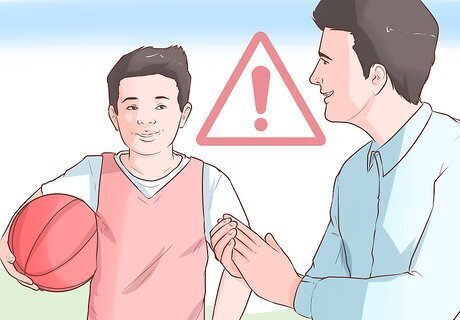
Avoid insincere praising. Adults often fall into the trap of too much praise, fearing that one non-positive comment will damage their children’s self-esteem. However, too much praise will seem insincere to the child. It can also create a sense of entitlement -- the child believes they can do no wrong -- and they may come to depend on it in order to accomplish anything. Children may not develop an “internal cheerleader” that helps them feel good about themselves, if they are constantly hearing empty praise from others. Instead, they can be led to believe that they’re only good if someone tells them they are. As a result of too much praise, children may be afraid to take risks and try new things. They begin to believe that their value lies in their accomplishments, rather than their efforts, and they are reluctant to set themselves up to fail with something new.

Encourage good behavior through targeted praise. Acknowledge a completed chore, a positive sibling interaction, or other behaviors you’d like to encourage with appreciation. Naming the valued behavior in a positive way will help reinforce the behavior for your child. For example, you could say, “Carlos, thank you for putting away your toys this afternoon without being asked. That was very helpful.”
Encouraging Resiliency
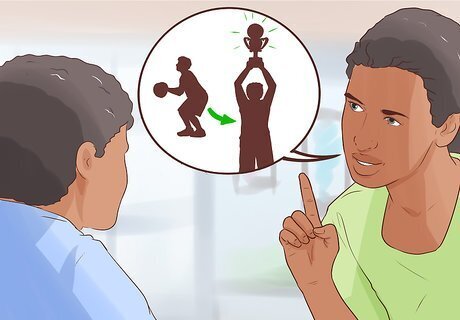
Remind them that no one is perfect. Kids, like adults, are surrounded by images of people at the top of their game, succeeding and accomplishing important goals every day. Your child may be frustrated when they realize they can’t emulate their favorite singer or baseball player. Teach your child that no one is born knowing how to do anything perfectly.
Remind your child of the value of working toward a goal. You could use their childhood idol as an example. You could say, “Yes, LeBron James is incredibly talented. But he didn’t just get where he was by walking in off the street and trying out for the team. When he was your age, I bet he was shooting baskets at the park every day.”
Help your child understand and set realistic expectations for themselves. If a child is disappointed that they’re not a star tennis player, they are likely not going to feel very good about themselves. Help your child understand that most goals take a long time to accomplish, and that they can take baby steps every day to work towards that goal. Encourage them to be proud of the effort they put in and the progress they make, rather than focusing on how far they are from achieving a goal.
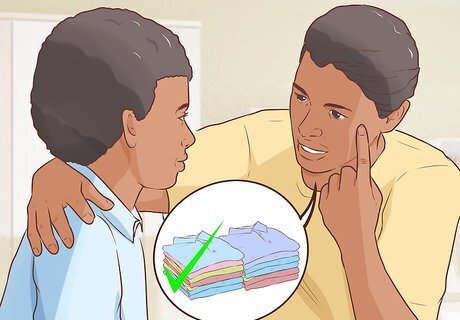
Choose correction over criticism. Building a child’s self-esteem does not mean avoiding discipline. Ignoring a child’s mistakes means that you are depriving them an opportunity to learn from wrongdoings and make other choices to change their behavior in the future. Provide teaching opportunities while disciplining your child, rather than limiting your discipline to criticism. Instead of saying, “Your dresser is a mess! All your clothes are just thrown in there and now they’re wrinkled! You can’t seem to keep anything neat!” you could say, “Have I shown you how to fold your clothes? Let me show you. It’s helpful to have a good way to organize your dresser, so you can find something easily. Your clothes won’t get so wrinkled, either.” It’s okay to tell your child that you are upset with something they did. It’s important to teach a child that their behavior impacts other people. For example, you could say, “Mommy is very upset that you hit the baby. We never hit each other, because hitting hurts. What will you do the next time you are upset that the baby took your toy instead?” Avoid name-calling or using loaded language when disciplining, like “You’re so clumsy!” or “Can’t you ever get this right?” If you find that you are losing your temper, give yourself a timeout. Establish clear boundaries and rules in your home. Indicate consequences for not following the rules, and follow through with them as necessary. Your child will feel confident in knowing what is expected of them.

Use their natural talents to teach them about hard work. If your child shows a natural ability in sports, the arts, or another area, give the child plenty of opportunity to develop those talents. If they are naturally talented in these areas, they will see how some effort will easily pay dividends. Then you can show them how hard work can carry over into other aspects of their lives. A child’s talents and success will improve their self-esteem and make them feel more confident that they can accomplish goals in other areas. If your child feels daunted by a difficult task, remind them of their previous successes. For example, “Do you remember your piano recital? You had a really difficult piece to play, but you practiced note by note and page by page until you mastered the piece. Because you worked so hard, you had an excellent performance. The same goes for your math homework. Look at this problem by problem and keep trying until you get it right.”
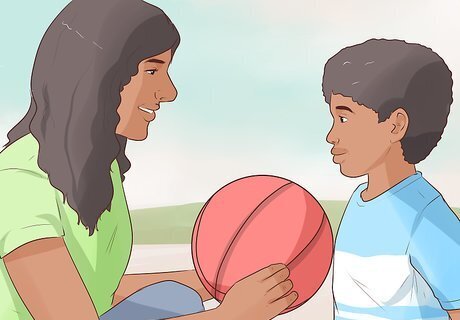
Encourage them to play sports. Through athletics, kids learn that they can practice to improve their skills and achieve goals, building self-esteem. It also helps kids learn to handle setbacks and defeat. Enroll your child in a team sport to learn teamwork, sportsmanship, and make new friends. Allow your child to participate in the decision as much as possible. If there are a variety of sports to choose from in your area, let your child pick which one they would like to try out. If your child is not into team sports, find a solo athletic activity they could participate in, like martial arts or dance. Sports also help your child stay physically fit and healthy, which further boosts self-esteem.

Give them chores. Children as young as two can have basic chores around the house. Having chores helps children feel more valuable, building self-esteem, and it also helps build resiliency and self-discipline. Sometimes work must happen before fun. You may want to make a chore chart to help your child see their responsibilities and track their completion. Assign chores according to age and ability. Give kids jobs that they will be able to complete with little to no adult supervision.
Helping Your Child’s Social Growth

Avoid making comparisons. Don’t compare your child with their classmates, siblings, or even yourself as a child. Show your child that you value them as an individual, not by how they are better or worse than others. Don’t say, “Your older brother was such a better reader at your age,” or “Why can’t you be more social, like your friend Bianca?” If your child is worried about how they measure up against their peers, reassure them that you love them no matter what, and that everyone has different strengths and weaknesses. You could say, “I know Ian is the best in your class at math, so it must be really frustrating to sit next to him sometimes. But I know how creative you are, and how much you enjoy writing stories.”

Pay attention to your child’s friends. Make sure your child is friends with other children who appreciate them and treat them with respect. You likely want your child to be surrounded by people who bring out the best in them and will help give them self-confidence, so monitor their friends and relationships closely. Notice your child’s behavior after playing with a friend. If they do not seem like they are in a good mood following a playdate, it may be helpful to keep a closer eye on the relationship to ensure good compatibility with the friend. Good friendships have positive influences on a child’s self-esteem, but bad friendships can be harmful. If you are concerned about your child’s friend being a bad influence on your child or that the friendship is incompatible, do not hesitate to intervene. Kids often need a lot of help figuring out how to have healthy friendships.

Create a welcoming environment for other children. Welcome your child’s friends into your home. You will have a noisier home and more bags of pretzels to purchase, but you get the benefit of watching how your child interacts with their friends. If your child and their friends need extra assistance, you can step in and role model appropriate behavior. If children are able to develop their self-confidence in social situations at home, the more likely they will remain confident in new social situations away from your watchful eye. If kids aren’t getting along or behaving inappropriately, you can step in and correct the behavior. You could say, “In our house, we don’t exclude friends. Everybody is playing the game,” or “How do you think you could solve this problem? Both of you want to play with the truck.”

Spend time with your child. If possible, schedule some one-on-one time with you and your child once a week. Have a special outing or set aside some time to just be together. This shows your child how much you value them and the time you spend together. Younger children may want to play, while older children may want to do a special activity. Ask your child what they might like to do. You could give them a choice, for example, “Would you rather go to the park or go for a bike ride together tomorrow?”
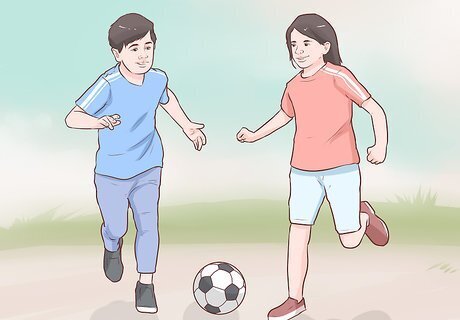
Give your child plenty of opportunities for play. Make sure your child has lots of opportunity for unstructured play during their day, both with and without others. Children learn through play, and through it they gain feelings of accomplishment and confidence. Play with your child. Take time to play with your child as often as you can. Let them choose the activity -- it will make them feel important and special to know that you are playing “their” special game.
Role Modeling Self-Esteem for Your Child

Show them your love. A child’s self-esteem begins with a parent or other trusted adult showing them love and acceptance. Laying this groundwork for them means that they can learn ways to love and accept themselves. Make it a point to frequently remind them that you love them. Give them lots of hugs and kisses. Snuggle up together and read a book. Be responsive when they are upset. It shows that you are paying attention to them and what they have to say matters. Hold them when they cry and help them feel safe and loved as they express difficult feelings.

Express your feelings. It’s okay to show your child that you are upset. Show how feelings can be expressed appropriately. Your child will see what those emotions look like, how you deal with anger or sadness, and it will increase your child’s emotional awareness. Seeing you upset can help your child learn ways to make you (and others) feel better, boosting their self-confidence. If your child spots you crying, you could say, “Yes, I’m sad right now. My friend told me some bad news. Sometimes when I’m sad it helps me feel better to cry. Do you ever feel better after you cry?”

Cultivate a positive body image. Be proud of your body, and share your pride with your child. Avoid putting too much emphasis on the valuing the appearance of your or other people’s bodies. Role model body positivity so your child can know how to be proud of their body, as well. You could say, “What I like best about my body is that I have arms to give you a hug! I like that I can run and swim and hike with my body. I also like how my eyes look brown in some light and green in others. What do you like best about your body?” Participate in a race or other athletic event so your child can see you using your body in a healthy way. Avoid criticizing your appearance in front of your child. Don’t complain about your weight or something about your appearance you dislike.
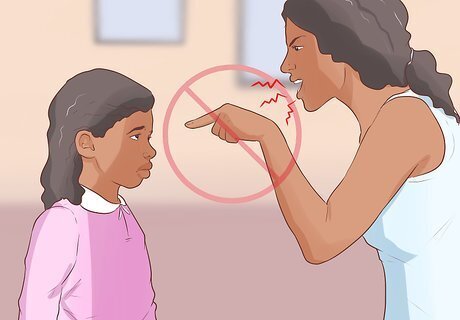
Avoid name-calling or sarcasm. Being around children who are constantly demanding can be stressful, and a parent or other caregiver can feel overwhelmed by their needs. It can feel like an easy release to lash out or be sarcastic with your child, but diminishing their feelings only leads them to believe that their feelings are not important. Over the long term, this can harm their self-esteem. If you are feeling stressed out or frustrated, try to take a short break from the child, even if it is just going into another room for a moment to collect yourself. Role model appropriate behavior by not using name-calling words to describe other people. For example, when someone cuts you off while driving, don’t yell, “You idiot!” with your child in the car. Apologize to your child if necessary. It role models how to say you’re sorry, and it helps a child feel secure that a grown-up can admit when they are wrong. Saying you’re sorry shows that you have good enough self-esteem to face the consequences of your actions. You could say, “Miles, I’m sorry for not using kind words with you earlier. I was upset, and I should have taken a break rather than lash out at you. You didn’t do anything wrong, I did. I’m sorry I hurt your feelings.”

Model positive self-talk. When you feel proud that you have accomplished a goal, let your child know. Celebrate your successes with your child. Talk about how mistakes you’ve made don’t make you a failure. For example, if you get a promotion at work, share your news with your child. You could say, “I am so proud of myself today! I’ve been working on a project for a long time, and today my boss told me that I did such a great job on it, they know I am ready for more responsibility, so I am getting a higher position at work. I reached a goal, and I am feeling great!” Role model what your child can say to themselves when they make a mistake, even a small one. For example, if you spill something in front of your child, you could say, “Oops, I just knocked over the water glass. I made a mistake, but I can fix it. I’ll get a towel. I screwed up, but it’s okay.”



















Comments
0 comment